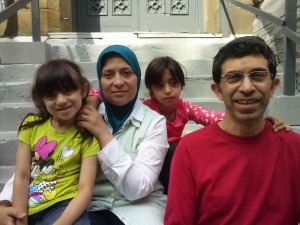
By Tracey Arial
www.thesuburban.com
Several neighbours are working hard to help Tarek Mohamed Khalifa and Samah Sayed Abdel Meguid stay in Canada. Unless the Federal Court grants a stay of deportation, the Verdun-based couple will be sent back to Egypt on Friday.
“We have been here eight years and at this point our family is more Canadian than Egyptian,” said Tarek Khalifa. “How is it in my daughters’ interests to send us to Egypt? It makes no sense to treat people like this. We are appealing to our neighbours and community in Verdun and more broadly in Montreal to help us stay here in our home.”
Even worse than the legal turmoil they face, the couple also have to decide whether to take their two girls, eight-year-old Sarah and six-year-old Aicha, with them to Egypt or leave them with friends in Canada. The girls are Canadian citizens and can remain in the country if their parents can find suitable caregivers.
The parents don’t want to leave their children behind but they also don’t want them in danger. Also, their elder daughter Sarah needs regular treatment for a seizure disorder that might not be readily available in Egypt.
“If they leave their kids here, they don’t know if they’ll see them again,” says Amy Barratt, who works with South West United Church and Mission. “They don’t know if they’re going to be imprisoned. They keep hearing stories about people being rounded up and thrown in jail. It’s in such disorder, that country.”
Barratt doesn’t know the family well, but she was so moved by their plight, she set up French and English petitions on change.org to ask the Verdun-wide community to support them in asking for a stay of deportation until they can exhaust all their possible legal avenues. The two petitions got 270 signatures in the first ten hours.
Immigration activists are seeing more cases of parents being separated from children who are Canadian citizens, says Mary Foster, a Verdun resident and Solidarity Across Borders volunteer who is helping raise awareness about the family predicament.
She wonders whether refugee commissioners understand that Canadian citizenship is based on place of birth, not blood.
“I can think of dozens of other cases where parents and children are separated, sometimes for life,” said Foster. “These are not cases we can usually talk about, because families are too frightened to speak out publicly. I really admire Tarek and Samah for going public as they have. When people like that speak out, people can see how unfair our immigration law is becoming. Why have these legal processes failed this family over and over again?”
The legal process has been long, complicated and full of disappointment. It has taken almost eight years for three different applications to run their course. All were rejected.
Khalifa and Abdel Meguid filed a claim for refugee status on Nov. 24, 2006, a month after arriving in Canada. It took three years for a commissioner to reject their claim.
According to Federal Court Judge Scott in a later review, “the officer, in this decision, was aware of the general situation in Egypt, but found that the applicants did not state how the new conditions would cause them unusual and undeserved or disproportionate personal hardships that could justify granting the requested exemption. Unfortunately, the applicants did not raise or file evidence to establish that they would find themselves in a worse situation than that of other Egyptians.”
Immigrant support groups disagree with the officer.
“The Committee to Aid Refugees believes that serious errors were made in the rejection of the Khalifa’s refugee claim and they could indeed face danger in the violence and instability of present-day Egypt,” said Richard Goldman, coordinator of Comité d’aide aux refugiés–Montréal.”
The couple’s lawyer also did not contest the judgment in Federal Court, something that’s also being questioned by the couple’s supporters.
“People describe the system as a lottery,” says Foster. “If you’re coming from Europe and you have a lot of money, there’s no problem. If not, you have to get the right lawyer and the right commissioner to be accepted.”
Attempts by the family to stay in the country as permanent residents on humanitarian and compassionate grounds and via a pre-removal risk assessment also failed.
The most recent disappointment came on Jan. 16 this year, when Federal Court Judge Scott dismissed their request for a judicial review.
“They are currently awaiting confirmation of their Certificat de sélection du Québec. The two girls attend school in French, where Aicha is beginning kindergarten and Sarah would continue into the second grade provided she is not uprooted and torn away from our community.”
